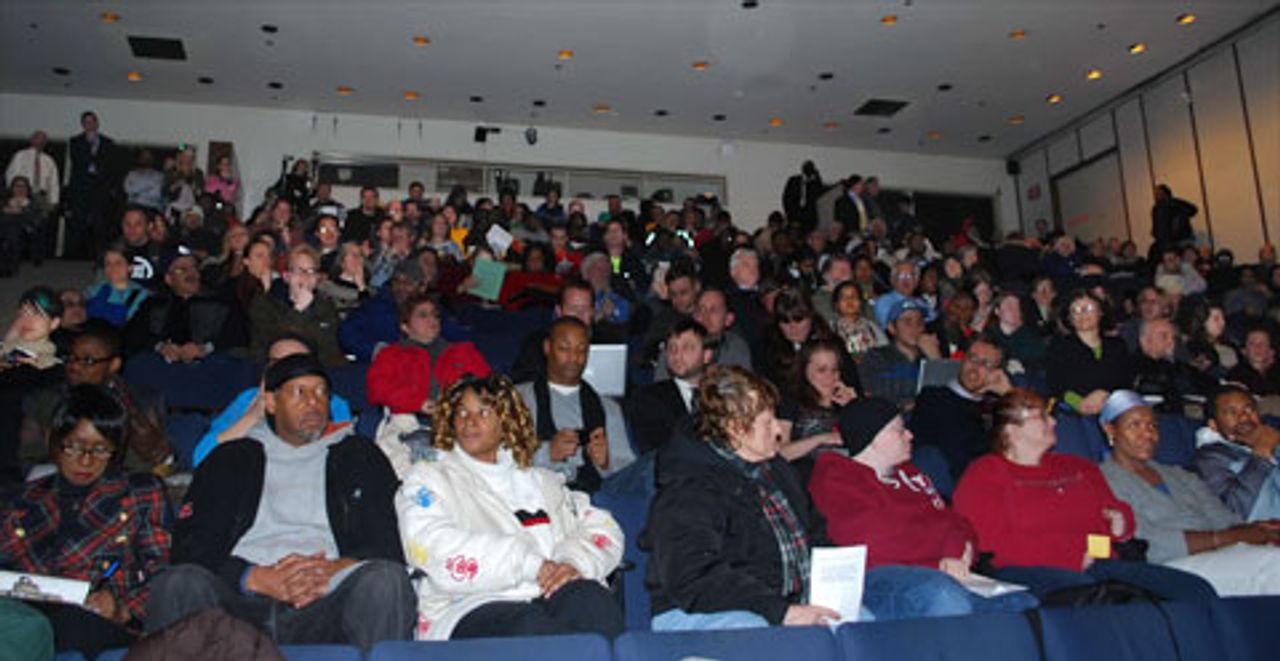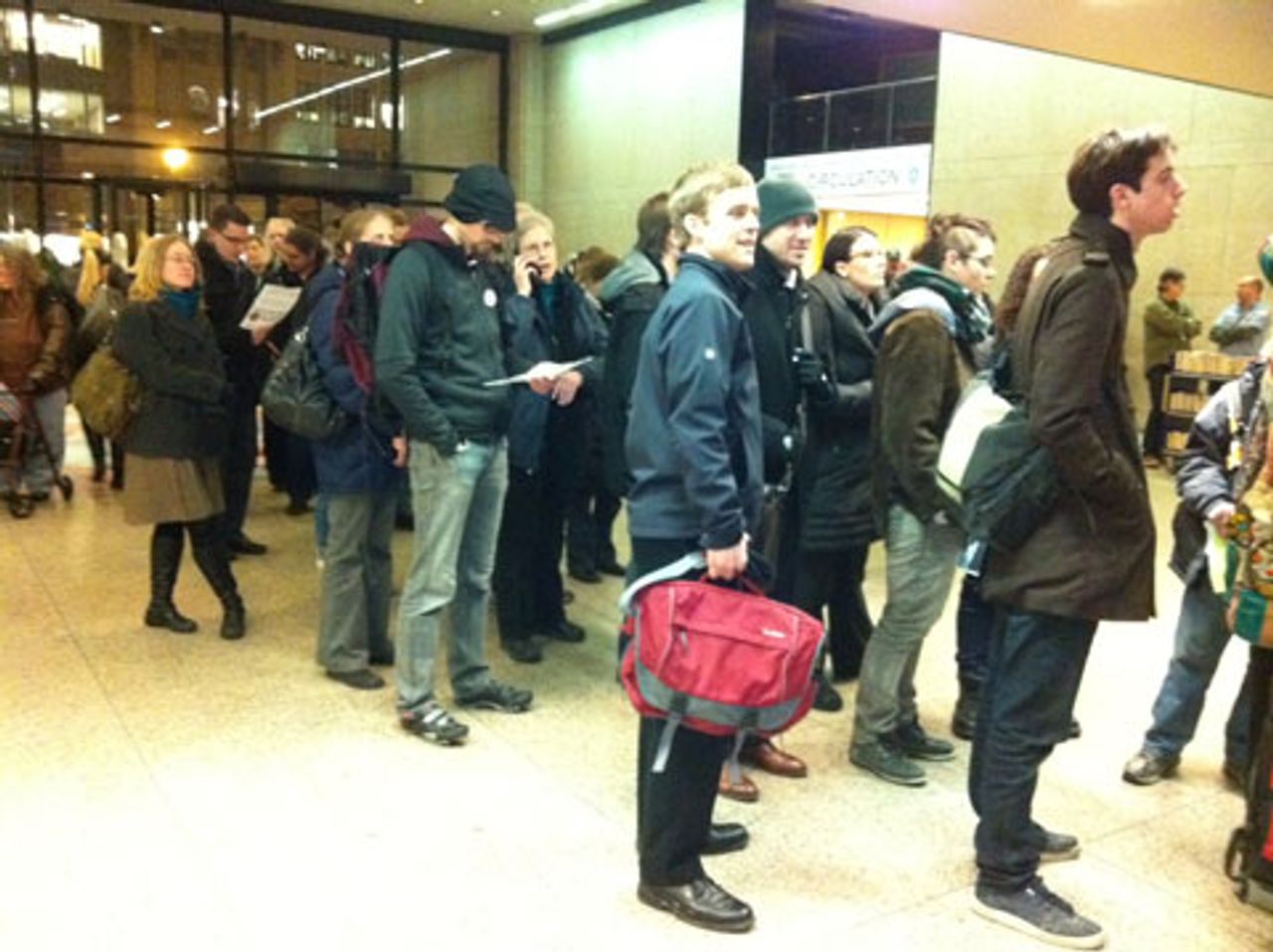Close to 5,000 people have attended public hearings throughout the Greater Boston area to protest proposals from the Massachusetts Bay Transportation Authority (MBTA) for steep fare increases and drastic cuts to the region’s transit system.
 Audience at public hearing
Audience at public hearingThe largest meeting to date took place February 13 at the Boston Public Library (BPL), where more than 400 people assembled to denounce the cuts. The attendees filled both the main hall and an overflow room, while police turned away dozens more who had formed a line almost out the door of the building.
Those turned away were told to attend meetings on other nights in other locations, with no attempt to accommodate them at the BPL meeting. Police, both uniformed and plain-clothed, patrolled the lobby of the library, at one point pushing Occupy protesters out the door.
Many attendees heckled Mark Boyle, assistant general manager for development at the MBTA, and booed loudly as he laid out the grim financial picture facing the “T” and the two proposals that would raise fares by an average of as much as 43 percent and eliminate up to 75 percent of current bus routes.
The immediate cause of the crisis is claimed to be a $160 million balloon payment due this year on the system’s $5 billion debt. When asked at a state transportation agency expo at the beginning of February to explain the scheduling of this year’s payments and those due again in three years, State Transportation Secretary Richard A. Davey was unable to do so.
Stating that payments will increase by another $330 million in three years under the current MBTA debt repayment plan, Davey told a reporter from the Worcester Telegram & Gazette that he was “uncertain of the reasons those payment escalation plans were agreed to, or when they were approved,” adding that “it was a mistake and imprudent to agree to those repayment plans without having a plan in place to pay for them.”
Davey and the MBTA are now demanding that this “mistake” be paid for by working people throughout the region in the form of fare hikes and service cuts.
 People line up to attend the meeting on MBTA fare hikes and service cuts
People line up to attend the meeting on MBTA fare hikes and service cutsAt a breakfast meeting of the Blackstone Valley Chamber of Commerce, February 15, Davey cynically claimed that what had come out of the public hearings is support for fare hikes. “What we’ve heard from customers is that they’d rather pay a little more than see their service cut,” he said.
This was echoed by the chamber’s president and CEO, Jeannie Herbert, who claimed a survey about proposed commuter-rail cuts last month showed that passengers “don’t mind paying the extra fare, but they don’t want service cuts. Our concerns are for tourism as well. If you’re cutting weekends and evenings, you’re cutting tourism.”
Under both scenarios put forward by the MBTA, commuter rail services would be eliminated on weekends and after 10 p.m. on weekdays. MBTA ferry routes used by thousands of commuters as well as tourists and others would be eliminated outright. Services on the Green Line’s E Branch and Mattapan Trolley, which serve some of the city’s most impoverished areas, would also be eliminated on weekends. Both plans project the loss of around 500 jobs.
The fare hikes and services cuts particularly target The RIDE, a service used by the disabled. Students and seniors would also see their fares increase dramatically.
Davey told the chamber of commerce audience: “The MBTA is the most indebted transit agency in the United States: $5.5 billion in principal. You add the interest that will be over 30 years, it’s over $8 billion.” The MBTA will spend $425 million on debt service this year, more than it will spend on payroll.
While state and local politicians have appeared at various hearings to claim opposition to the transport cuts, the only alternative that has been proposed is the so-called “gas tax”. With already sky rocketing fuel prices, this too would make working people pay for a crisis that is not of their making.
Massachusetts Governor Deval Patrick’s budget chief has said the administration will not support the use of state reserve funds to reduce the transit funding gap. Finance Secretary Jay Gonzalez told members of the House and Senate Ways and Means committees that the state’s taking on some of the $2 billion in debt assumed by the MBTA for expansion projects related to the Big Dig would be a “mistake” requiring “money we don’t have.”
Supporters of the Socialist Equality Party have intervened at the public hearings insisting that affordable mass transit is a social right that is not negotiable. A leaflet distributed at the meetings stated, “Not only should cuts to existing services and fare hikes be resisted, there should be a citywide offensive for improvements to services. Instead of cutting jobs and services, more workers should be hired to overhaul the system, which is in a state of disrepair and plagued by breakdowns.”
The SEP leaflet stated: “The starting point for addressing the financial crisis of the MBTA should be the repudiation of the debt. The banks and financial institutions have already received billions of dollars in bailout money from the Obama administration. Now working people are being asked to accept fare hikes and service cuts in order to pay back the debt at extortionate interest rates.
“The claim that there is ‘no money’ to finance the T is a lie. There are more than 58,000 millionaires in the Boston area, with nearly one in 20 families worth at least $1 million. Over the past two decades the wealthiest households in the state have seen their incomes rise five times faster than the poorest and twice as fast as those in the middle class.
“Boston has some of the country’s top educational institutions, such as Harvard and MIT, with massive endowments and tuition fees over $50,000 a year. “Clearly the issue here is not a lack of money, but who decides how the money is to be spent. The Socialist Equality Party insists that as an essential public service, the T should be financed through taxes placed upon the wealthy corporations who pay out billions each year in executive compensation.”
Opposing the representatives of the two big-business parties that dominate political life in the city and state, the statement raised the political issues in the fight to stop cuts and fare hikes: “A fight against the T cuts and to defend other vital services means a break with these two parties—the Democrats and Republicans, which accept social inequality and the domination of the banks and corporations over all aspects of life. What is required is the building of a political movement of working people, bringing riders, T workers and others together in a fight to defend and expand the social rights of the working class.”
The Socialist Equality Party is holding a public meeting in Boston this Thursday to advance the elaborate a socialist program to defend transit service and all the social rights of the working class and to rally support for the SEP’s 2012 election campaign.
Public Meeting
Thursday, March 1, 7 p.m.
YMCA, 316 Huntington Avenue
Boston MA 02115
